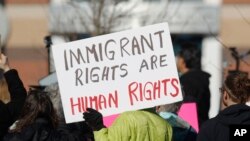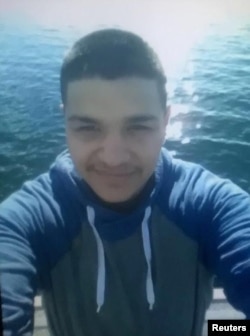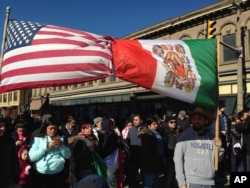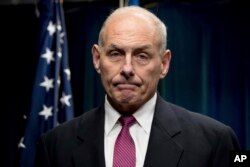Last week's arrest of Daniel Ramirez Medina, a 23-year-old Mexican father, set off a flurry of uncertainty and fear regarding the future of one of former President Barack Obama's executive actions: the Deferred Action for Childhood Arrivals program, commonly known as DACA.
Approximately 750,000 undocumented immigrants who were brought to the United States at a young age — nicknamed "dreamers" — depend on the program to live and work in the U.S. without fear of deportation. Ramirez, who was arrested in Seattle, was the first known recipient of the program to be arrested and detained in an immigration raid.
During a Thursday press conference, President Donald Trump vowed to deal with DACA "with heart," a subject he called "very, very tough."
"You have some absolutely incredible kids, I would say mostly," Trump said. "I find it very, very hard doing what the law says exactly to do, and you know the law is rough."
The president also said he was planning to issue a new executive order by next week to replace the order that suspended travel from seven Muslim-majority countries and temporarily barred most refugees. He said it would be tailored to last week's federal court ruling suspending his travel ban, a decision he called "very bad."
Legal challenges
There are many unknown factors in the case of Ramirez's detention, including whether this was an isolated incident. The action, according to U.S. Immigration and Customs Enforcement (ICE), was routine. In a statement to Reuters, ICE spokeswoman Rose Richeson called Ramirez a "self-admitted gang member" and a risk to public safety.
But Ramirez's lawyers, who have unequivocally denied the allegation, filed a petition Monday in a Seattle federal court, calling his detainment unjustified and a violation of his Fourth and Fifth Amendment rights under the U.S. Constitution.
"There's the questionability of the arrest itself: [ICE] didn't have a warrant for his arrest," Camille Mackler, director of legal initiatives at the New York Immigration Coalition, told VOA, based on the court document filed on Ramirez's behalf. "So there is some Fourth Amendment issue here at play of unreasonable search and seizure."
DACA applicants must have clean criminal backgrounds in order to benefit from the program. Victor Nieblas, immediate past president of the American Immigration Lawyers Association, told VOA that Ramirez's vetting determined he was a suitable candidate for the program.
"That he was a qualified beneficiary proves that there is something going on here," Nieblas said. "There is something systematic going on, and the fact that the attorney makes allegations that [Ramirez] was coerced into admitting that he belonged to a certain group or groups falls into line with some of the conduct from the Department of Homeland Security."
Assuming the worst
New York City, a hub for pro-immigrant activist communities, has seen protests against Trump's immigration orders almost daily. Pending the outcome of Ramirez's case, immigrant rights groups have begun to assume the worst.
"Donald Trump's executive orders have made everyone a priority for deportation," Greisa Martinez, a DACA beneficiary and advocacy director of United We Dream, said in a press release. "Donald Trump and Republicans must say in no uncertain terms that DACA recipients are safe."
But after this week's events, many activists wonder whether a politician's word is enough. During a CNN-hosted town hall meeting last month, U.S. House Speaker Paul Ryan, a Wisconsin Republican, reassured an undocumented mother and DACA recipient, Angelica Villalobos, that she would not be targeted for deportation.
"I see that you love your daughter and you are a nice person who has a great future ahead of you, and I hope your future is here," Ryan said to Villalobos. "If you're worried about, you know, some deportation force coming, knocking on your door this year — don't worry about that."
In a statement released Monday, Department of Homeland Security Secretary John Kelly said that more than 75 percent of the more than 680 individuals arrested last week were criminal aliens, suggesting that 25 percent were not, a break from policy under Obama.
"They will continue targeting our communities," said Antonio Alarcon, an immigrant youth organizer at Make the Road New York, during a protest outside New York's U.S. Citizenship and Immigration Services building. "We are going to have four years to fight back."
"Obama was a deporter-in-chief, but we know that things can get much more violent under Trump," added Nelini Stamp, membership director of the progressive Working Families Party. "We are going to do everything possible — I'm going to do everything possible — to protect my community."








